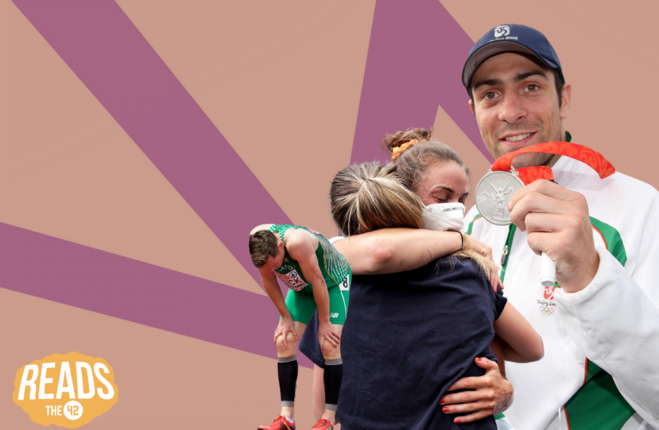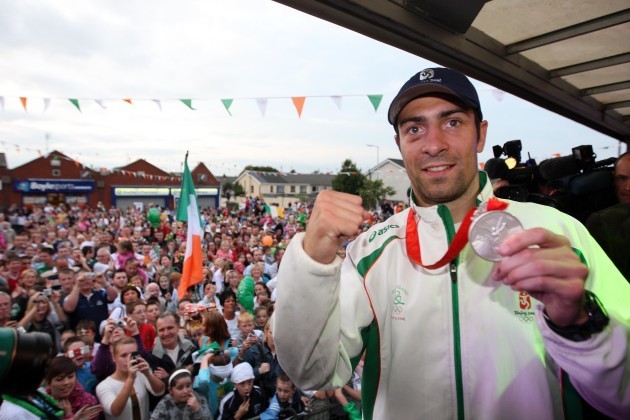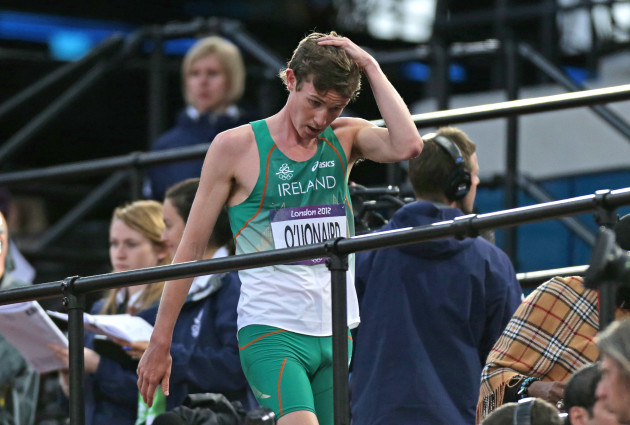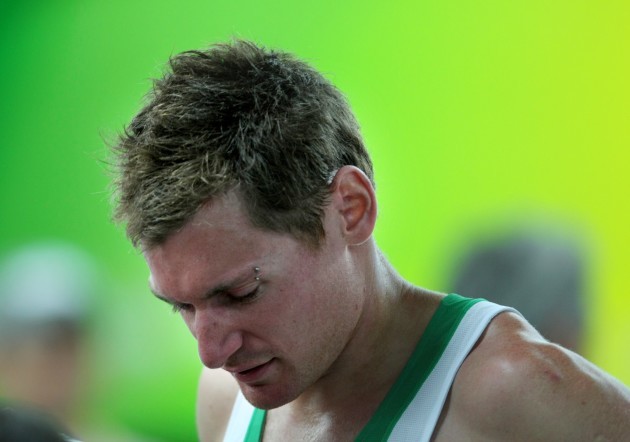LAST UPDATE | 12 Sep 2021
AS THE LUFTHANSA flight from Beijing taxied into Pier C at Dublin airport on Tuesday, 26 August 2008, Ireland’s latest Olympians were preparing to go their own way.
Kenny Egan, with shining silver around his neck, would soon depart through the plane’s front exit alongside fellow Olympic medallists Paddy Barnes and Darren Sutherland. At the other end of the aisle, David Gillick watched from a distance.
“It was awful really,” Gillick remembers. “The whole team was more or less on the flight. When we landed in Dublin there was a roll call of the medallists up front, and then people who had maybe PB’d or had good results a little bit further behind, then it was the basically ‘the rest of yiz, just go out the back of the airplane.’ It was literally like that.”
Ireland’s latest Olympians will currently be working their way through vastly contrasting emotions. Some will have surpassed even their wildest expectations in Tokyo, while others may look back at the Games and feel nothing but regret.
It’s the nature of any Olympic Games. All athletes fly out with ambitions of achieving long-held dreams, but only a handful will ever fly home having done just that.
- For more great storytelling and analysis from our award-winning journalists, join the club at The42 Membership today. Click here to find out more>
Back in 2008, Egan was one of the lucky few. Listening to his recollection of that homecoming, you’d swear the boxer had come in on a different flight to Gillick.
“It was great,” Egan says. “Jesus, I remember the crowds through Dublin airport. I’d been through that airport many a time with a medal, and there would be no-one there, you know? But to come back with an Olympic medal? That’s the cream of the crop.”
Egan’s success in Beijing made him a household name in Ireland, the Dubliner taking second in the light heavyweight division and returning home to a hero’s welcome.
His life would never be the same again.
It’s very strange, because people that you know all your life look at you differently. They want to touch your hair and all this strange stuff, and you’re kind of saying ‘Hang on, I was only drinking pints with you two months ago!’ So that whole fame thing can be dangerous (after an Olympics), I fell into that trap.
“The media are only doing their job at the end of the day, but I hated them back then because I felt they were very intrusive, and some of them were.
“It hit me hard and fast. Don’t forget, we live in a small country. When you go to an Olympic Games, especially Beijing, we were locked in the Olympic village. The only phone call I made was once a day to my mam, that was it. I didn’t know what was going on at home, didn’t know the interest that was building up with every fight I won.
“So to have that intrusion when I went home, it didn’t sit well with me. I couldn’t handle everyone knowing my name, everyone wanting a photo with me and all that type of stuff. My little getaway was alcohol, and when I was drinking I was escaping from all of that.”
Others found different ways of escaping their post-Olympic reality. Athletics is a demanding, often selfish vocation, but once every four years sporting pursuits that remain somewhat niche get catapulted in front of a global audience where champions can become legends. It’s not a nice stage to fail on.
Naturally, that means some athletes can place an intense pressure on themselves heading into an Olympics. If things don’t go to plan, the post-Olympic comedown can be a lonely place.
Gillick didn’t make it out of the heats in Beijing, running his slowest time of the season on the biggest day of his career. There were contributing factors – he was exhausted, a little run down – but they don’t get included on the final result sheet. All the records say is that he failed to qualify.
“I hated it. I hated the Olympics, it was the worst experience ever,” he says. “I know it sounds unfair to say that, but you are there to run well and qualify through the heats, and when it doesn’t work out the way you wanted, the whole thing is tainted.
For me, I was lucky that I lived in England, so when I came home I could spend a couple of days (in Ireland) and then go back to the UK where nobody knew who I was and you could hide in a way. But I can remember a few of my mates came over and took me out for a couple of beers, and even the taste of beer was muck because you’re just not able to enjoy it. It’s one of those things where you just need a bit of time.”
At the London Games in 2012, Ciarán Ó Lionáird ran injured in the 1500m heats, finishing 13th out of 14 runners in his heat. Just moments after suffering the most bitter disappointment of this running career, and with his Achilles still burning, one of Ireland’s most talented runners was telling RTÉ that the Olympics had “been the worst experience of my life.”
“I just took the first month (after the Olympics) to totally disconnect,” Ó Lionáird says.
“I tried to be disciplined with just not thinking about it. I went back to Florida, where I was in college, and I just totally zoned out. I went to some concerts, took a month totally off running, and just didn’t really think about it all.
“I didn’t think that becoming an Olympian was that great of an accomplishment at the time because I had made it to World Championship finals, so just making the Olympics didn’t seem like it was much to me. And to be honest, I ran like shit and I think people weren’t too happy about it in Ireland, so I didn’t really feel that anybody else felt it was good either, so it was just about moving on to the next thing.
The Olympics is like the tree in the forest that has long branches and blocks the sun, so no other trees can get any light. It doesn’t give light to some of these other competitions that I think athletes can go and really excel at. That’s just the nature of how the sport is viewed and portrayed. It’s in the public sphere once every four years.”
At the other end of the scale, returning home as a champion can also be overhwhelming for an amatuer athlete. Egan has spoken at length about his struggles with alcohol as he tried to settle into his newfound, largely unwanted fame.
“I remember coming home and there was no structure in place for us to come back training or anything,” he says, before pointing out that those structures are much improved now.
“The association didn’t know how to handle it because they weren’t expecting medals either. We hadn’t won a medal since ’92, so this was all new. They didn’t know how to handle it, I didn’t know how to handle it, no-one knew how to handle anything! It was just a free-for-all.
This summer, Dublin rower Eimear Lambe was part of a bronze medal winning Ireland team in the women’s coxless fours, and came home to a hero’s welcome and colourful parade through the street of Stoneybatter. Life already feels very different for the 24-year-old.
“It’s been a bit of a whirlwind, getting noticed and people following me on Twitter,” Lambe says. “It’s not something I’m used to, people coming up to me in shops and car parks, all that kind of stuff.
“I was in a pub with my family the week after I came back. Some guy came up to me, up to my dad actually. My dad was chuffed. He just said hi and well done, and I said thanks and about 10 minutes later a bottle of champagne was sent to the table with glasses… So yeah, it’s weird.”
With an Olympic medal already to her name, Lambe can now aim for Paris 2024 with nothing to lose. After the disappointment of 2008, Gillick eventually found motivation in the idea that he could get back to the Olympics in 2012, and give a better account of himself.
“I came sixth in the Worlds in ’09 and I was very much thinking London was where I could podium,” he explains.
“My belief was that there was a bronze medal there. But it didn’t happen through injury and suddenly your whole life changes. I was at home back in my old bedroom in Ballinteer, in my parents house, thinking why amn’t I in London?
“I was doing a bit of work for RTÉ in the studio in Dublin, and I watching my teammates and my competitors compete, and I wasn’t there, and that was heartbreaking. You’re trying to put that pundit’s eye on it but all wanted to do was to be out there running on that track.” Ó Lionáird had a similar experience. After returning to running following a short break following the 2012 Games, he began plotting a course to Rio 2016. That dream ended as injury issues flared up again. An Olympian himself just four years previously, he now found the Games difficult to watch.
“Rio was tough because leading into that year, the goal was still to make it,” he says. “You’re thinking ‘Oh man, I should be there.’
Then a good friend of mine won the 1500m, Matthew Centrowitz, and I was delighted for him. But we came out of college together in 2011 with the same PB, so you look at that and think, ‘Aww fuck, I’m not even at these Olympics and yet someone with whom I came out of CA together has won an Olympic title!’
“It feels so close to you, but also so far away.”
So, what advice for someone who feels they came in short in Tokyo? “Treat it as a learning moment,” Ó Lionáird continues.
“Treat it as exposure to the level that you feel you want to be at. Then think about the things that you can do in order to put yourself on that level. There’s not going to be as much attention on you for three years, so use the time in between to be productive.”
“Enjoy the moment because you are probably coming off the high of the Olympic Games, the buzz, so enjoy everything that comes with that and give yourself a bit of time,” adds Gillick.
“Then talk to your nearest and dearest, talk to your support team and try and think about what worked well and what you can work on for the next phase because you need something to motivate you and inspire you to go into the next couple of months.”
But, Gillick admits, appreciating the achievement of becoming an Olympian is easier said than done.
“Put it this way, a lot of athletes over the last couple of weeks have got their Olympic tattoos,” Gillick explains. “I was like ‘Yeah, when I go to the Olympics I’ll get myself an Olympic tattoo.’ Then it didn’t go that well and to be honest, I said to myself that I don’t deserve an Olympic tattoo.
It was only in 2017, my wife got me a voucher for my birthday to go and get an Olympic tattoo. I went and I got it, and it was only then I started to realise what it had really meant to become an Olympian, and for me those rings inspire me and motivate me, and remind me of something that I dreamt about becoming, and that I worked hard and I got there.
“That’s what it’s about, but it took me almost 10 years before what it meant to be an Olympian sunk in.”
“You know it’s funny, I think this past Olympics is actually the first time I’ve ever had the chance to actually appreciate it a little bit,” Ó Lionáid says.
“Because where I live now in Los Angeles, a lot of people I know have no idea that I ever ran or have any clue that I went to the Olympics.
“I was at a couple of dinners over the summer where someone would be talking about the Olympics, and someone might say ‘Oh you know Ciarán ran at the Olympics?’ and then they’re like ‘What the fuck, that’s crazy’… Then we end up talking about it and I’m thinking to myself ‘Wow, people think this is actually kind of cool,’ you know?
“I was kind of surprised, and it’s kind of strange, but I think I’ve had the time away from it now, and I got back to some running last year and I really rediscovered a love for the sport. It was probably the first time since I retired that I was really able to enjoy the Olympics, and just look at it as someone who enjoys the sport.
“I was watching it and I was thinking, ‘Yeah, I guess it was kind of cool that I ran in that once.’”
For more great storytelling and analysis from our award-winning journalists, join the club at The42 Membership today. Click here to find out more>




